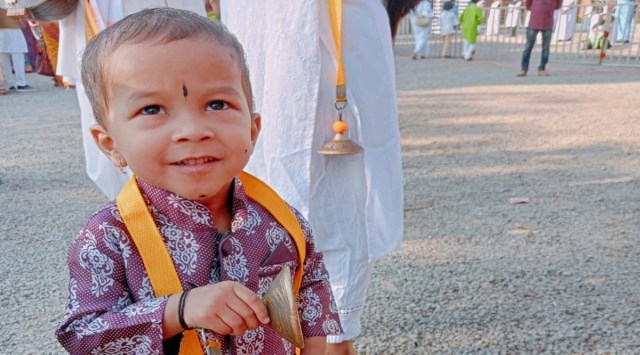Pune doctors save toddler from rare case of pneumonia, underline importance of vaccination
World Immunization Week – which is observed from April 24-30 – aims to highlight the collective action needed to protect people from vaccine-preventable diseases.
 In June last year, Varad's parents were in for a total shock as their only child suffered from fever, cold, cough and had difficulty breathing.
In June last year, Varad's parents were in for a total shock as their only child suffered from fever, cold, cough and had difficulty breathing. A 2.5-year-old boy who suffered from a rare case of pneumonia and was on ventilator support for more than 150 days is now finally able to breathe on his own. Nearly five months after his discharge from a private hospital in Pune, not only is Varad Suryawanshi from Pimpri doing well but he is also missing the ICU nurses so much that his parents ensure he gets to talk to them over the phone frequently.
In June last year, Varad’s parents were in for a total shock as their only child suffered from fever, cold, cough and had difficulty breathing. “We were so scared as Varad was unconscious and not responding. At the local hospital nearby too, his oxygen levels plunged and some doctors told me survival chances were almost nil,” his mother Apoorva recalled.
Varad was shifted to Surya’s Mother and Child Care Hospital where the paediatric ICU team placed the child on a mechanical ventilator as a precautionary measure. He had bilateral pneumonia and X-rays showed that nearly 80 per cent of his lungs were infected with the virulent bacterium streptococcus pneumonia. Special catheters were inserted to drain the air pockets that formed in and outside his lung tissue, but further treatment was necessary to improve lung function.
Dr Amita Kaul, Senior Consultant, Paediatrics and Paediatric Intensive Care at Surya Hospital in Pune, said any case of pneumonia can get worse. “The little boy’s case was particularly concerning for the team as prolonged ventilation opened the doors for further complications,” Dr Kaul pointed out. After several procedures, including a tracheostomy and repeated insertions of chest tubes via seven surgical procedures, the little boy was finally able to breathe on his own and was discharged from the hospital, she said.
‘Pneumococcal vaccine crucial’
“Children do get affected with pneumonia and a few suffer from complications, but these can be devastating. Hence the public message is crucial that the child should be administered the pneumococcal vaccine which is now part of the national immunization programme,” Dr Sachin Shah, director of PICU at the hospital in Wakad, Pune told The Indian Express.
Dr Shah said long-term ventilation has its challenges and hence barrier nursing, air mattresses and other strategies are utilised for preventing and controlling infections. “The medical staff demonstrated their clinical excellence and patient monitoring skills throughout the five-month treatment process and were successful in averting further complications,” he said.
World Immunization Week – which is observed from April 24-30 – aims to highlight the collective action needed to protect people from vaccine-preventable diseases.
Dr Ganesh Shiwarkar, Senior Consultant Paediatrics and Paediatric Intensive Care at Surya Hospital, also stressed the importance of vaccination to prevent invasive pneumococcal disease in children under the age of five. He said two vaccines are available – pneumococcal conjugate vaccine (PCV13) and pneumococcal polysaccharide vaccine (PPSV23). “We generally give the PCV13- doses at 6 weeks, 10 weeks, 14 weeks and 15 months as a booster and parents should ensure that these doses are not missed,” he said.
Today, Varad happily runs around and waits to climb his father’s shoulders when he returns after work while his mother Apoorva ensures that there are no gaps in the treatment protocol. “Varad has not been well ever since he recovered from chicken pox and perhaps in that phase of illness, the pneumococcal vaccination may have been missed,” she recalled.
On the day of his discharge, the boy refused to leave the nurses who had been caring for him and they had to convince him that he was being taken for a joyride. “Till date, some of our nurses talk to him almost daily,” Dr Shah said.


































